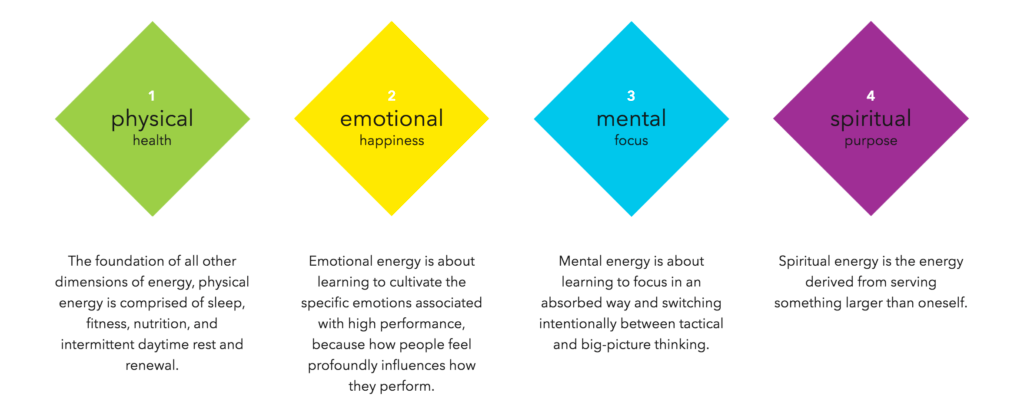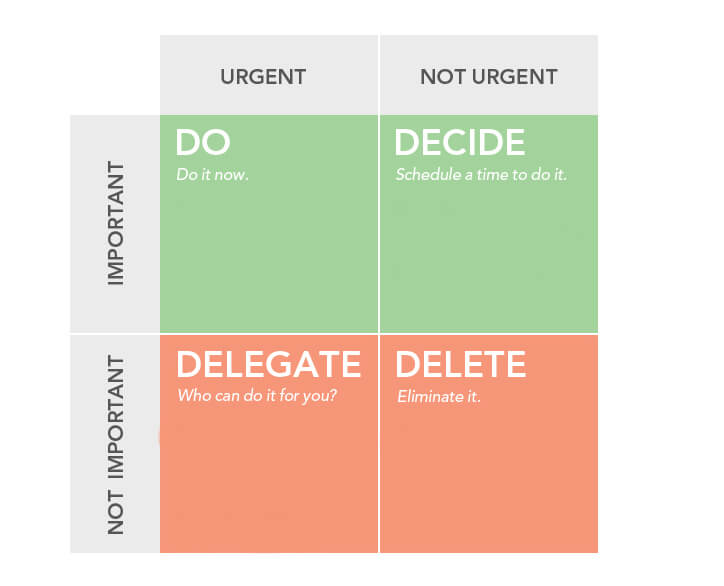Should You Manage Your Time or Your Energy?
Everyone has some ideas on how to better manage their time and energy. However, there seems to be this common understanding that we have to choose between the two. What if, instead of choosing one over another we can actually manage both at the same time? This 7-minute read will give you insight on how to improve your productivity with both time and energy management.
In today’s business environment, people are expected to achieve more than ever before. And staying competitive means continually higher performance from your team. No wonder we all wish to have more hours in our day. How else could we ever get everything done and reach our goals? Just like that, the race is on, and we are all running against time. Our backs pushed against the wall and our default status “always busy”.
The bad news: regardless of our efforts, there is no winning against the time. There simply isn’t a way to borrow, buy or expand time. Which means that time is our most valuable asset and one we should not waste. One solution to this never-ending race is finding a better way to manage our time. And time management has been a focal point of many conversations about productivity for a while now. There is an abundance of different information on the most effective ways to manage our time.
“The truth is that time is the greatest equalizer in life. No matter who you are, you have the same amount of time as the next person. It’s not about how much time you have. It’s about how effectively you manage your time.” – Robert Kanaat, author and entrepreneur
Read on: How to Analyze and Optimize Your Team’s Time Usage
Shift to energy management
Unfortunately, time management on its own has some obvious drawbacks. No matter how much we try to manage our time, it all comes down to the simple realization that there are still only 24 hours in one day. That begs the question, “Why are some people able to fit so much more into the same time space?”
There appears to be a common denominator. Admittedly, those highly productive people have mastered their time management skills. However, they have also found a way to get the most out of their day. How? They know that without the energy to do the things we map out, we can’t reach our full potential. This has brought us to a new situation where the conversation about productivity has slowly shifted from time management to energy management.
What is energy management?

Source: ‘Humans Are Not Machines’: Tony Schwartz On the 4 Pillars of Optimizing Energy
Energy management is an especially important skill in today’s world, as an increasing number of people are suffering from burnouts. According to a recent study, on average 57.2% of tech employees said they were feeling overwhelmed by their jobs. You really have to have focus, motivation and well-being to be on top of your game and maximize your productivity. All three can be aligned when you know how to best manage your energy. Schwartz and McCarthy have mapped out the following four levels of energy that every person should be mindful of:
- Physical Energy is mostly related to how healthy we are and is influenced by caloric intake, exercise, our general health and sleep. Right foods and movement give you the energy to tackle all the tasks in your schedule. Furthermore, physical activity has also been proven to increase productivity.
- Emotional Energy, in other words, the quality of our energy. If you are in a negative emotional state, you burn through your energy much quicker. However, in a positive emotional state, you can preserve your energy. A great way to assure that you have more positive energy is to not beat up yourself over every little thing. Equally important is to celebrate your victories.
- Spiritual Energy. This type of energy can be better understood when having an understanding of what is the purpose of any given task in hand. It is closely related to a person’s faith and beliefs. To improve your spiritual energy, you should always stay true to your personal values and missions – both in your own life and on an organizational level.
- Mental Energy or focused energy is best harnessed when the first three energy types are kept in my mind and practiced. This way it is easier to have a clear mental focus and avoid distractions, which are crucial for our productivity.
Everything about your business, one click away
Shifting from “either-or” to “and”
One common misconception is that you have to choose between whether you manage your time or your energy. Most articles encourage people to choose energy management over time management. But what if, instead of choosing one over another, we start treating them as a winning combination that together makes up an equation to productivity:
Productivity = Time management + Energy Management
Gathering information on how best to manage your time or energy, it became evident that there is considerable overlap between these two. On a personal level, the way we manage our energy is not so much different from the way we manage time. There are many insightful lists full of tips and tricks on how to optimize both and increase your productivity through these practices. Thus, below we have compiled a list of 8 ways on how to better manage your time and energy at the same time.
1. Set Goals – Setting goals will help you and your team determine how much time should be focused on specific tasks. However, setting unrealistic goals will lead to demotivation and drain you from energy. The key is to set realistic and achievable goals. Whenever setting goals, follow the acronym SMART, which entails that every goal should be:
- Specific – Set goals that are clear and specific; otherwise you will have a hard time focusing your efforts or feel overwhelmed to achieve your goals. When working in a bigger team, also identify team members working towards the goal and the resources you have.
- Measurable – To see progress and stay motivated, it is important to set measurable goals. Being able to assess progress helps everyone with remaining focused and meeting deadlines.
- Achievable – Don’t set goals that are unrealistic and unattainable. A simple trick is to base your goals off of your own analytics, not industry benchmarks.
- Relevant – Your goals should matter to you and also align with bigger overall goals. This is especially important within a company, where any goal should be closely related to the company’s overall vision.
- Time-bound – Set deadlines. This will help you to stay focused on the important tasks and not let you be overwhelmed by urgent everyday tasks. Having a time pressure on your team will also push them to work harder.
2. Prioritize – Prioritizing is another relevant aspect of making the most of your time every day. In his book “7 Habits of Highly Effective People”, Stephen Covey uses “Eisenhower Matrix” to describe what activities should be very high in your task list. Eisenhower matrix divides activities into four quadrants based on two factors: urgency and importance. The key is to focus on getting important activities done when you are most active.
3. Schedule tasks – Once you have made clear what the goals and priorities are, it is easier to schedule tasks for the day or the week. While rearranging tasks into your schedule, be mindful of your most productive hours. This way you can decide which tasks are a priority and schedule them into your high energy periods. Keep in mind that any task scheduled should advance your goals.
4. Don’t multitask – It might be tempting to multitask since we are constantly expected to achieve more. Unfortunately, multitasking doesn’t lead to higher productivity. Quite the contrary – most people are not capable of multitasking. Which means dividing your focus between various things will lead to increased time in accomplishing tasks and reaching your goals. In addition, multitasking is energy costly and will lead to exhaustion much quicker.
5. Delegate tasks – Since we are incapable of multitasking, it might not be a good idea to take on too much. This way, you are not capable of managing everything. Too many tasks mean that you are also spreading your valuable energy all over the place, not allowing yourself to focus on one thing at a time. Therefore, grant authority to the people who are qualified. You will save your time and energy, reduce stress and ensure goals and deadlines are met.
6. Learn to say “no” – “Stephen Covey has said, “You have to decide what your highest priorities are and have the courage pleasantly, smilingly, and unapologetically – to say “no” to other things.” By saying no, you will save your time and energy for more important tasks that advance your goals.
7. Minimize distractions – This is especially crucial during your high-energy periods. By allowing distractions to take over will cost you some valuable time. Therefore, eliminate all the things that might be distracting and focus only on the task in hand.
8. Take “breaks” – People often feel that taking breaks is a waste of time. In reality, it’s smart time management. Breaks are found to result in higher and more sustainable performance. Taking breaks is necessary to recharge your mental and emotional energy. Allowing your brain to relax and wander off can also lead to better ideas.
Read on: Want to Get 30% More Tasks Done? – Use a Weekly Work Plan
Ultimately, focusing on either energy or time management is a good start. But there are issues you will eventually run into when choosing one over the other. Only focusing on your time management skills is not enough because not all hours are created equal. On the other hand, only focusing on energy management will not be sufficient to accomplish everything and reach your long-term goals. You have to have an understanding of how to use your most energy high periods most productively.
Therefore, we should be mindful of both and try to incorporate them into our everyday behavior. A simple but effective way to make sure that you and your team are working productively is to keep track of your time usage. Having an overview of where your team members are spending time on and who is taking on too much work is a great way to make sure that all goals are met more efficiently and quicker. In turn, knowing where time is allocated enables you to automate some tasks, freeing up more valuable time and energy for billable work.
With Scoro you can easily have a detailed overview of everyone’s time usage. Although Scoro is much more than just a time management tool, it has all the necessary features to guide your team’s everyday work. One of the key benefits of using Scoro as a time management software is the detailed reporting it provides you with. Thus, you can make decisions based on facts not on your gut feeling.
Read more about the time-management features Scoro offers or sign up for a demo to see how Scoro can improve your entire business management.
Continue reading:


